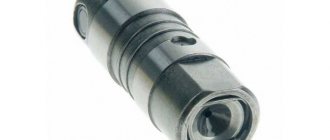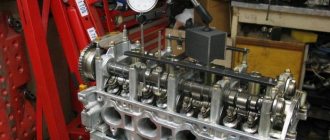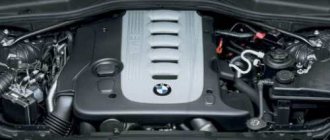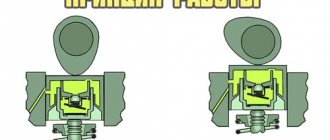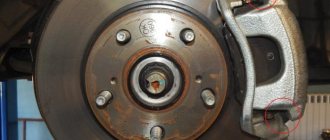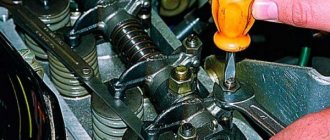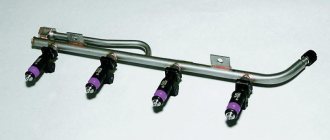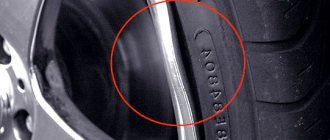Any extraneous noise in a car engine often makes owners feel wary. And even if these sounds do not affect driving performance in any way, their very appearance makes the driver think about diagnostics. Many cars have knocking pins when accelerating, but this problem is often ignored. The sound appears when the car picks up speed. If you do not pay attention to this in time, much more serious problems arise. At the same time, car enthusiasts cannot determine the reasons for the appearance of knocking noises, nor can they fix this problem on their own. Let's look at the reasons for these sounds that are unpleasant to the driver's ear, and also find out how to fix these problems with the engine.
The engine is experiencing detonation: what to do?
The first thing to do when there are characteristic sounds coming from under the hood is to try to reduce the load on the car’s engine.
You should not accelerate sharply and demand the maximum from the engine - this will only wear it out and shorten its service life. If you use low octane fuel, you should switch to high octane alternatives. There is no point in buying expensive gasoline; regular 95 will do just fine. Just in case, check the high-voltage wires and spark plugs: it is because of them that detonation often occurs.
If none of the above helps, you should contact a car service for help.
Where to go and what to do if there is a knock in the engine?
A used car often throws unpleasant surprises at its owner, for example, it suddenly begins to break down. It would seem that just yesterday everything was fine, but today suddenly some strange knocking noises begin to be heard from under the hood. Let's try to figure out what could be knocking there, and what the driver needs to do. After all, knowing the nature and source of sounds, you can assess how critical the situation is and plan a budget for upcoming repairs.
Why is the engine knocking?
There are quite a few reasons for knocking in the engine, these can be:
- pistons in the cylinder,
- piston pins,
- camshaft and crankshaft,
- valve
But regardless of the specific source of the knock, the root cause of its appearance is wear of parts. A car engine operates under very difficult conditions, which inevitably leads to wear and tear on components. Even the slightest loss of lubrication or local overheating can lead to knocking noises.
When the pistons knock
Even a non-professional mechanic can distinguish the sound of pistons in cylinders from other sounds. The sound is more like tapping on a ceramic pot than a metallic ringing sound. It appears mainly when the engine is not warmed up and disappears when the engine warms up, but in an advanced stage it knocks constantly. This happens due to the appearance of a small gap between the piston, or more precisely, its rings, and the cylinder. As a result, when the piston is moved, it begins to touch the lower part (skirt) against the cylinder.
Piston pins
Unlike pistons, the fingers knock loudly, with a clear metallic sound. They begin to ring especially loudly when applying gas or releasing gas. The reason for its appearance also lies in wear and the appearance of a gap at the junction of the pin and the piston. According to motorists, the main cause of this problem is the use of low-octane gasoline. Therefore, if the manufacturer recommends using 95-grade gasoline, then you should not pour 92-grade gasoline.
Knock on the cylinder head
The most common cause of engine knocking is problems in the cylinder head (cylinder head). This sound is more like a frequent clicking sound than a knocking sound. The main “suspect” is hydraulic compensators. On some engine models they need to be adjusted periodically, but on older cars they could simply wear out.
As the engine warms up, the knocking of the hydraulic valves usually goes away. There is no need to be especially alarmed; a small knock is even considered normal or a feature of the operation of a particular motor. In addition to hydraulic compensators, the camshaft itself can also knock. This happens due to insufficient lubricant or due to wear.
Source of the article: https://www.drivenn.ru/journal/novosti/kuda-bezhat-i-chto-delat-esli-v-motore-poyavilsya-stuk-id30109
What does knocking fingers mean when accelerating a car?
The very definition of “knock of fingers” does not entirely correctly describe the situation that occurs in the engine when the problem in question occurs. There are no “fingers” knocking in the engine, and the sound itself comes from the impact of the blast wave on the cylinder walls.
During normal engine operation, the air-fuel mixture enters the combustion chamber, and its explosion occurs evenly, starting from the spark plug. In such a situation, the speed with which the blast wave propagates is about 20-30 m/s. If the engine has problems with detonation, that is, an excessively enriched mixture enters it, then it detonates immediately after entering the combustion chamber.
Diagnosis
Piston knocking in an engine can occur for various reasons. Try to determine the nature of the knocking by the signs listed below and see what you can do:
- The first case is a knock when moving the piston. In this case, the sound comes from the area at the top of the engine block. The knock is dull and is best heard at idle when the engine is hot. Solution.
- Case two - knocking of the piston pin on the connecting rod. A sharp short knock from the engine block area. Solution.
- Case three - connecting rod knock. The knocking sound is low and comes from the bottom of the engine block. It is best heard when the car is on a lift or on an overpass. Solution.
What needs to be fixed?
“Piston reversal” is the point at which the piston stops moving up and starts moving down. At this moment, its speed in the longitudinal direction of the cylinder becomes zero, and the lateral load is significant. In a normal case, the shift occurs gently, the piston rests against the oil film and does not warp. The piston begins to knock in the following situations:
- Significant wear of the cylinder in the upper part. A gap appears that is not sealed by an oil film, and when the direction changes, the piston in this gap moves laterally and warps, hitting the cylinder wall.
- The piston pin mounting sockets in the piston have worn out. In this case, the piston begins to move relative to the pin and touches the cylinder walls.
- Curvature of the piston rod. In this case, the piston does not move strictly along the axis of the cylinder, and the symmetry of the mechanism is lost. An additional sign of a bent rod is increased vibration when the engine is running; it shakes noticeably.
How can I fix this?
In the last of the cases described, only repairs and replacement of the piston group will help.
If the problem is the knocking of the piston in the cylinder or the wear of the piston pin seats, the use of a tribotechnical composition of the “Active” series, which is added to the engine oil, will help. The composition cleans the friction surfaces, and then under its influence a protective metal layer is formed on them.
- The layer restores the geometry of the cylinder, optimizes clearances and prevents rocking and distortion of the piston.
- The layer restores the shape of the seats, preventing play of the piston pin.
Do you have a car with a non-boosted gasoline engine up to 1.6 liters?
What's the result?
So, if your fingers are knocking during acceleration, your fingers are knocking under load, etc., then first you should:
- fill with high-quality fuel;
- check and adjust the ignition timing;
- eliminate problems with fuel supply that lead to a lean mixture;
- check the power system for possible air leaks;
- diagnose the operation of the engine cooling system;
- carry out diagnostics of the internal combustion engine and decarbonize the engine (if necessary) to remove carbon deposits from the combustion chamber;
Why does the fuel-air mixture detonate in the combustion chamber? Reasons causing detonation. Consequences of detonation combustion of fuel in internal combustion engine cylinders.
The most common causes of engine knocking are: piston knock, connecting rod knock, crankshaft knock. What to do if the engine suddenly starts knocking while driving.
The appearance of knocking noises in different diesel operating modes. Fault diagnosis. The nature of the knocks of the crank mechanism, timing gear, and fuel equipment.
What can knock, whistle, rustle and make other extraneous sounds under the hood after starting the engine. Diagnostics and determination of faults.
The design and purpose of the piston pin in the design of the crank mechanism of the internal combustion engine. Types, features of manufacturing and installation of piston pins.
Purpose of the piston in the design of the internal combustion engine. Features and design of the piston, oil scraper and compression rings.
What type of repair will be required
If a knock on the beam is clearly detected, and mechanics can easily determine this, then a major overhaul is inevitable. The block will need to be bored to repair size and larger pistons installed. Where this is not provided, the motor is lined by pressing thin-walled liners under standard pistons and rings. Overhaul technologies that eliminate piston knock are clearly regulated and unambiguous.
Many people rely on the use of advertised restorative additives. Allegedly, a special material is deposited into the increasing gap and the surfaces are restored. In fact, it is possible to remove piston knock using an additive only in rare cases and for a short time. Most often this is due to a change in the viscosity of the oil after adding the substance from the “magic” jar. What can be done without additives, just fill in another oil.
Why do my fingers knock in the engine when accelerating? let's understand the problem
Why do my fingers knock in the engine when accelerating? To answer this question, you need to understand why this phenomenon occurs. In normal conditions, ignition of the combustible mixture occurs evenly. Explosive combustion of fuel begins near the spark plug and simultaneously spreads in different directions.
The explosion propagation speed is about 20-30 m/sec. In the event of detonation, the over-enriched mixture begins to explode immediately after entering the combustion chamber. The blast wave moves chaotically, colliding with the walls of the cylinder, the remainder of the mixture explodes. The wave speed can reach 1000 m/sec.
Consequences. As we have already found out, detonation is essentially uncontrolled combustion of fuel. At the same time, the cylinder walls heat up unevenly; in places where the blast wave hits, the temperature rises significantly. This can lead to deformation of the cylinder block.
The piston may also overheat and become deformed. A blast wave under certain conditions can damage the valves. It can also damage the connecting rods. In any case, systematic and severe detonation will lead to the need for major engine repairs.
Defect manifestation and diagnostics
Piston knocking occurs both when the engine is cold and after warming up. It is diagnosed by frequency and timbre. The frequency is a multiple of the crankshaft rotation speed and the number of cylinders (although only individual parts can knock, which blurs the picture). The timbre is duller than that of the gas distribution mechanism, but louder than that of the crankshaft bearings. The sound is usually localized closer to the combustion chamber of the block.
As a rule, with such malfunctions, oil consumption due to waste increases greatly. This is a typical sign that it is time to completely disassemble the engine and repair it.
Detonation and knocking of fingers in the engine: causes and solutions
Many motorists are concerned about the question, why do the fingers knock in the engine when accelerating the car? It is worth saying that the formulation of this question is initially incorrect.
Currently reading: Renault Logan knocking when turning - Autopark Magazine - New Logan
Although the phrase “knock fingers” itself is very common, it is still incorrect. Piston pins cannot knock, but in fact we hear the sound of a shock wave of exploding fuel.
Fuel combustion in a working engine occurs sequentially. Starting near the spark plug, the flame gradually occupies the entire combustion chamber.
However, there is another type of combustion called detonation. During this phenomenon, the entire fuel-air mixture in the combustion chamber explodes sharply, while the pressure and temperature in the engine cylinder increases significantly. Such an explosion is called detonation. And the knock from this explosion is the answer to the question of why the fingers knock in the engine.
There is also the concept of engine vibration, which is often confused with detonation. If detonation is associated with fuel combustion, then vibration is the process of vibration of the power unit caused by a malfunction of its installation.
How to avoid?
It would be useful for every car enthusiast to know how to avoid problems with detonation. There are certain countermeasures that can reduce the risk of this type of knocking occurring. All techniques are usually aimed at preventing premature ignition of the fuel mixture.
The easiest way is to increase engine speed. This can be achieved in several ways. When driving, try to increase the speed smoothly. If you want to start sharply, then first slowly spin the engine to the required speed, and only then start moving.
You can also reduce detonation by selecting the heat value. In this situation, select “hot” candles. They will allow the mixture to be burned more efficiently and without residue. In this case, no turbulence will arise here.
Conclusion. Such a phenomenon as detonation always appears unexpectedly and can frighten car enthusiasts. In this case, they begin to wonder why the fingers in the engine are knocking during acceleration. In fact, there may be several reasons for this phenomenon. Moreover, not all of them can indicate a breakdown; sometimes these are design features.
Negative consequences of detonation
Detonation, by its nature, is destructive in nature, can lead to breakdown of various parts and assemblies, and can also become a fundamental reason for engine overhaul. Therefore, modern internal combustion engines operating at high speeds can fail in a short time, precisely because of detonation processes.
There is a very common misconception among car owners that an increase in pressure due to an increase in speed has a positive effect on increasing engine power. But the situation is exactly the opposite. The duration of the blast wave is very short (0.0001 s).
The same time is allocated to increase the pressure on the pistons. Consequently, they will not be able to affect the engine power in such a tiny amount of time. And it is quite likely to cause significant damage to various components and parts.
When the blast wave hits the cylinder walls with enormous force, it significantly destroys the oil film. This film protects the CPG parts not only from “dry” friction, but also from corrosion, so its destruction will inevitably lead to partial mechanical wear and damage to the parts.
In addition, when a shock wave is formed in a sharp form, the thermal output from the burnt gas begins to increase towards the cylinder walls, which causes overheating of the internal combustion engine. This, in turn, will affect the condition and performance characteristics of gaskets, seals, spark plugs, pistons, etc.
Errors and possible consequences
When trying to eliminate knocking noises at low costs, the wrong steps are often taken, leading to aggravation of the problem and waste of time and money:
- pistons or rings are replaced without boring the block;
- numerous advertised additives are tried;
- the gas distribution mechanism and other erroneously identified sources of knocking are moved;
- the engine continues to operate until it completely fails.
The consequence is always the same - an increase in the cost of subsequent repairs, up to complete disposal and replacement of the engine. Although in the early stages you can significantly reduce the cost of overhauls, if you do not start the problem and do not clog the engine with foreign substances of unknown origin, as well as wear and oil waste products.
Where does knocking come from when the engine is hot?
The reasons can be very different, and the first priority when detecting knocking noises is to understand what parts are causing it. The service life of the engine as a whole depends on finding the cause in a timely manner and quickly solving problems.
- The most harmless reason lies not in the mechanism, but in a decrease in the engine oil level. When the engine knocks when hot, in road conditions the most that can be done is to use a dipstick to find out the current engine oil level. Lack of lubrication provokes friction of adjacent parts against each other, they can be damaged, which causes the appearance of characteristic knocking sounds.
Currently reading: Replacing brake fluid Renault Logan: step-by-step instructions, recommendations
When adding oil to the required level, the knocking should stop.
- It is necessary to listen to the intensity of the knocking noises; if there is a clear increase in them, then it is better to contact a car service center and conduct engine diagnostics. If the knocking in the engine when hot is uniform and is characterized by subsidence with increasing temperature, and no visible malfunctions or problems are detected, the car can be operated for tens of thousands of kilometers before it needs to be repaired.
- The knocking noise may come from the crankshaft. If the engine is under load, and the knocking occurs with increasing force, progressing over time, then the search for the problem is narrowed to the crankshaft bearings. It is dangerous to continue driving with such a malfunction, otherwise the situation will worsen and the engine will need to be overhauled.
- A knock in a hot engine can be produced by the valves when the crankshaft speed increases and the pressure in the lubrication level system decreases at the same time. In order to get rid of the knocking, you first need to normalize the pressure in the system so that the engine functions normally. It is important to select only a motor oil whose viscosity and properties satisfy the climatic conditions of a particular region, taking into account the season.
If the oil pressure is normal and the knocking does not stop, then you will have to remove the valve covers and check the clearances. Increasing clearances is the main reason for knocking and subsequent wear of parts.
This phenomenon is typical for cars with significant mileage, where gaps appear due to long use and natural wear of parts. The gaps must be set correctly; they are adjusted using a special set of feeler gauges that are placed in the spaces between the rocker arm and the top of the valve.
- As engine temperature changes, knocking noises can either increase or decrease. The first case is due to the fact that worn parts may expand slightly when warmed up, thereby reducing the gap, and this in turn leads to the natural disappearance of the knock. This situation is often observed in the cylinder-piston group of the engine. The second case is related to the heating of the engine oil. As you know, when the engine is hot, it liquefies, which can increase knocking in the bearings of the crank mechanism. Continuing to drive a car while the engine is knocking is very dangerous. To avoid serious damage to the engine unit, it is better to call a tow truck and take the car to a service station, where specialists will identify the exact cause and immediately eliminate it.
- Sometimes knocking occurs due to the human factor. A simple example: forcing a puddle at high speed leads to water hammer, which can lead to bending of the connecting rod. It happens that the part replaced during repair had a broken geometry, was of poor quality, or was installed incorrectly. The load on such parts increases significantly, which inevitably leads to deterioration of lubrication and an increase in temperature in the area of their operation. The result is rapid wear, increased gaps, and subsequently knocking.
It is important to understand that if a car owner saves on spare parts when overhauling an engine, this will not lead to anything good. If you don’t trust the car service center, you should try to purchase spare parts yourself, choosing the original manufacturer or an analogue with a good reputation.
If, after checking the gaps of the connected parts, it turns out that they correspond to the standard, it can be assumed that the engine is knocking when hot due to intense loads, or due to long-term operation in an overheated state. As a result, strong friction of parts quickly destroys the lubricant.
Solving existing problems
In each specific case, the repair technology will differ, depending on the identified faults. If this is a problem with the engine mounts or various attachments have failed, then such breakdowns are relatively easy to fix. However, if there is wear on the crankshaft and problems with the piston group, then such repairs fall under the category of capital repairs, and accordingly the car owner’s expenses will be extremely high.
In such cases, when engine noise increases, the car owner should not delay contacting service. The sooner he contacts specialized workshops, the easier and cheaper it will be to eliminate existing faults.
As a preventive measure, we can only recommend maintaining the car in technically sound condition, performing its routine maintenance in a timely manner, paying special attention to the quality of the oil used.
It is low-quality motor oil that most often causes such problems with a car engine. Lubricant can accumulate in hard-to-reach places, not providing high-quality lubrication of moving elements, and lead to increased wear. As a result, literally a few years after the start of operation, such a motor begins to operate at higher tones, and it is extremely difficult to solve such problems, since it is necessary to carry out a major overhaul of the engine.
Let's sum it up
There may be many reasons why the engine began to run louder. This is the use of low-quality fuel, improper operation of the lubrication system, problems with injectors, timing chain, wear of valves and camshafts. In such a case, it is extremely difficult to correctly identify faults and carry out repairs on your own; the car owner needs to contact workshops where specialists, using the appropriate equipment, will carry out diagnostics, identify characteristic breakdowns and restore the car.
Causes of engine detonation
The octane number of fuel is an indicator characterizing the coefficient of resistance of the fuel to ignition during compression (in other words, the detonation resistance of the fuel). Accordingly, an engine with a high compression ratio must meet gasoline with a high octane number.
Glow ignition is the spontaneous combustion of fuel in the engine cylinders. The reasons for this phenomenon may be burning soot or high temperature of the combustion chamber. It is also very important to select a spark plug with a suitable heat rating (there are “cold”, “medium” and “warm” plugs) so that the overheated insulator of the central electrode of the plug does not cause a fire.
A lean fuel mixture and an increase in the amount of air in the mixture compared to gasoline can also cause detonation. If a lean mixture enters the engine cylinders, it is much more likely to cause detonation than a normal mixture.
Currently reading: Renault Logan turn signals do not work | Auto-assistance
Detonation can also occur due to high engine load. Why the fingers “knock” in the engine when accelerating a car is precisely because the engine is overloaded. If you try at all, for example, to start right away in third gear, then with a high probability you will not even hear a dull knock, but a loud clang.
More about the reasons for knocking
When a car picks up speed, it is a stressful situation for the engine. Especially if you need to accelerate the car suddenly. When the driver presses the accelerator pedal to the floor for a sharp increase in speed, for example from one to six thousand, then the driver will hear the “fingers” knocking during acceleration (Priora is no exception).
It's quite normal. To quickly gain speed, the electronics supply more fuel to the cylinders with the same amount of air, which will definitely lead to detonation. But the situation is also possible with smooth starts. The driver will hear a characteristic knock. This phenomenon is not normal when accelerating smoothly. In these cases, it is necessary to quickly identify and eliminate the cause. This will help you avoid trouble.
Causes and solutions
This phenomenon can be caused by a large number of factors. They have varying degrees of danger. Sometimes, a small detonation is quite acceptable. All possible options for the occurrence of this phenomenon will be discussed below.
The most harmless is detonation, which occurs with a sharp increase in speed. If you sharply press the gas pedal at 1000 rpm, accelerating to 4000-5000 rpm, you can hear a short-term detonation. This is quite a common occurrence.
There is no need to be afraid of this; in this case, detonation will not lead to dire consequences. The reason is a sharp increase in the fuel supplied to the engine; the amount of air initially remains at the same level, this causes premature oxidation of the fuel, which is accompanied by explosions. The only way to combat this phenomenon is to avoid a sharp increase in speed.
Advantages and disadvantages of the variety
The variety has more advantages:
- it is a self-pollinating variety;
- attracts with beautiful, large fruits;
- the fruits ripen quickly - the harvest is harvested already in the third year;
- the variety is compatible with other crops (quince rootstocks);
- plants are frost resistant;
- trees are not prone to fungal diseases and are often resistant to pest attacks.
The Bryansk beauty pear is a unique variety that has virtually no drawbacks. The only disadvantages include deterioration in taste and the presence of defects in the appearance of the fruit, but only with a lack of moisture or drought.
Methods for eliminating detonation
Along with the reasons for the formation of detonation processes, there are a number of techniques to prevent it. Their goal is to actively accelerate the combustion process of the residual amount of the fuel mixture, as well as to slow down the flow of oxidative chemical processes formed in the cavity of the combustion chamber.
- Increasing the number of revolutions of a running engine.
- Organization of turbulization of fuel-air mixture flows in the combustion chamber.
- Reducing the path of the flame front.
Recently, techniques have been intensively developed using electronics to combat why fingers knock in the engine during acceleration. For this purpose, microprocessors are created to control the power unit.
The intelligent sensors being created make it possible not only to monitor all processes occurring and developing inside the cylinders, but also to correct them by changing the composition of the fuel mixture, as well as by changing the ignition timing.
Fingers knocking in the engine: reasons
The piston pin is an integral element of the crank mechanism. This part represents the axis of movement of the connecting rod in the place where the connection with the piston is made. In other words, piston pins make it possible to create a movable, hinge-type connection in relation to the connection between the connecting rod head and the piston.
The loads that the piston experiences as a result of the combustion of the charge of the fuel-air mixture in the cylinders of the internal combustion engine are also transferred to the piston pins. At the same time, the finger is subjected to an inertial force, a bending force. In this article we will look at the reasons why fingers knock in the engine during acceleration, why fingers knock under load, etc.
Read in this article
Knock of pistons
› Electronics ›
06.11.2019
Piston knock can have a variety of causes in engine operation.
• Piston misalignment due to too much clearance: too large a cylinder diameter or wear/material ingress causes the piston to become tilted as a result of the swinging movement of the connecting rod and the piston shifting in the cylinder, resulting in strong impacts of the head on the working surface of the cylinder .
• piston rocking due to insufficient clearance in the pin support: the clearance between the piston pin and the connecting rod bushing may be too small, the clearance may, however, also disappear during operation due to jamming or misalignment. This occurs especially due to connecting rod misalignment (bending or misalignment)
• Impact of the piston in the direction of the pin: The side impact of the piston on the cylinder wall comes in most cases from the connecting rod rod. Due to the misalignment of the connecting rod (bending, but especially misalignment), the piston during its stroke performs a swinging motion in the longitudinal axis of the engine, with the piston alternately striking the cylinder; asymmetrical connecting rods or eccentric support of the piston in the connecting rod have the same effect.
• alternating impacts of the piston pin on the piston pin stops: axial displacement of the piston pin is always a consequence of misalignment between the piston pin axis and the crankshaft axis.
As already described in the previous paragraph, bending or misalignment of the connecting rod, as well as asymmetry in the connecting rod, are the most common causes of such defects. Too much connecting rod bearing clearance (the connecting rod bearing journal on the crankshaft) can, however, cause the connecting rod to wobble sideways, especially at low speeds.
Why is knocking fingers in the engine dangerous?
Fuel combustion elements moving chaotically in the cylinder increase the temperature of the cylinder walls. If the engine operates in this mode, then additional loads will be placed on all its elements. When the driver does not pay attention to the problem, it leads to the following malfunctions:
- Curvature of the cylinder block;
- Damage to the valve or connecting rods;
- Piston deformation.
The longer the knocking of fingers continues while the engine is running, the sooner the need for a major engine overhaul will arise.
Why is detonation dangerous?
Detonation can lead to irreparable consequences for the car: burnouts, burns and damage to valves, breakage of piston rings - this is an incomplete list of possible damages. Engine housing parts may also crack. Modern engines operating at high speeds can fail in a matter of seconds due to detonation.
Find out more about the new Logan
- Tightening torques for Renault Logan cylinder head bolts
- Renault gasoline engines borrowed from Nissan (design, problems, resource)
- How to eliminate clutch squeaking in Renault Logan/Sandero? — Avtodelkino
- Brake drum: RENAULT, LOGAN I (LS_)
- Adjusting the clutch drive on a Renault Logan car
- Qualified repair of chassis, engine, gearbox, clutch for Renault in Samara.
- Renault Logan how much horsepower
- We are looking for the engine number for Renault Logan, where is it hidden?
